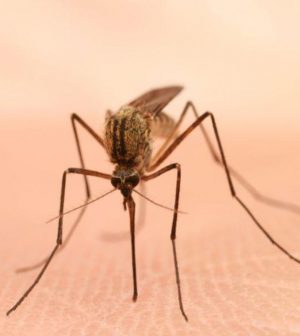- Could Your Grocery Store Meat Be Causing Recurring UTIs?
- Are You Making This Expensive Thermostat Error This Winter?
- Recognizing the Signs of Hypothyroidism
- 10 Strategies to Overcome Insomnia
- Could Artificial Sweeteners Be Aging the Brain Faster?
- Techniques for Soothing Your Nervous System
- Does the Water in Your House Smell Funny? Here’s Why
- Can a Daily Dose of Apple Cider Vinegar Actually Aid Weight Loss?
- 6 Health Beverages That Can Actually Spike Your Blood Sugar
- Treatment Options for Social Anxiety Disorder
Get Ready for More Mosquitos as World Heats Up

Warmer weather linked to climate change is likely to cause rampaging clouds of mosquitos in the future, a new study forecasts.
Rising temperatures can make it tougher for the predators that feast on mosquito larvae to effectively control mosquito populations, researchers say.
That’s because warmer weather speeds up the larvae’s development, leading to a smaller window of time for dragonflies to make a meal of them.
As a result, there could be nearly twice as many mosquito larvae that make it to adulthood, researchers recently reported in the journal Ecology.
“We might see larger populations of everyone’s least favorite bug,” said lead researcher Andrew Davidson in a Virginia Commonwealth University news release. Davidson conducted the research through the doctoral program at its Center for Integrative Life Sciences Education in Richmond.
For the study, researchers studied mosquitos in riverine rock pools at Belle Isle along the James River in Richmond.
They found that warmer pools contained more larvae, even when predators like dragonflies were present.
“While the mosquito larvae we studied here [are] the North American rock pool mosquito, these findings likely apply to species of mosquito that do act as vectors for diseases like West Nile or even Zika virus,” Davidson said.
More information
The U.S. Centers for Disease Control and Prevention has more about vector-borne diseases.
SOURCE: Virginia Commonwealth University, news release, Dec. 18, 2023
Source: HealthDay
Copyright © 2026 HealthDay. All rights reserved.










